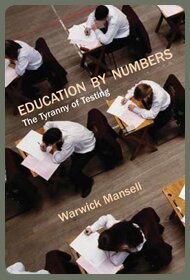When Ed Balls, schools secretary, first proposed creating a new regulator for the exams system, a perceived conflict of interest was one of the main reasons put forward.
In a 2007 paper setting out its plans to establish Ofqual, the Government said that the fact that the Qualifications and Curriculum Authority reported to ministers made it harder for the public to be sure of its independence. And the fact that the QCA developed national tests and exams and was supposed to regulate them gave rise to potential problems in the public mind, and notably a possible “conflict of interest” between those two roles.
Now an article I researched and jointly wrote for the Daily Telegraph, published last week, offers further evidence about what appears to be a similar difficulty. Only this time, it relates to an exam board itself, rather than to the regulator.
The documents show that Edexcel is marketing its GCSEs and A-levels to teachers by arguing that it can help schools to improve their results.
A teachers’ guide to the new GCSE in engineering, scheduled for first teaching in 2009, for example, says: “Find out why Edexcel is your best choice for better results”. It adds: “We have re-worded the [exam] instructions so no student will be flustered by them. We’ve given [students] advice on pacing themselves so they can achieve the best mark. Most importantly, we’ve ensured the questions are as accessible as possible.”
Similarly, a presentation from the board for GCSE religious education is entitled “Get better results”, and says that its syllabus “allows for better results for all your students”. There is more in the same vein.
To those who say that this is categoric evidence of an exam board marketing itself on its ability to make life as easy as possible for candidates, Edexcel does have some lines of defence.
First, it argues that simply to say that questions on a paper have been made more “accessible”does not mean that they have been made easier. Although this might sound bizarre to the lay person, it is defensible, to a degree. There is an argument that an exam question which is unclear, or gets in the way of extracting the right question from a pupil because the English is confusing for a student, needs to be improved. A maths exam, for example, with particularly wordy or poorly drafted questions, could turn into more of an English assessment than one testing maths. You could argue that anything that Edexcel can do to smoothe out that process should be applauded.
However, this looks to me to be spurious. First, it is not clear that there is evidence that exam questions are routinely getting in the way of pupils providing the right answer. And if candidates are provided with more guidance on how to approach a question, should that necessarily count as acceptable advice aiming to make the problem clearer? Or is it simply acting to take some of the challenge out of the exam?
And making the exam questions more “accessible” should have fairly obvious implications for what can be read into the results that follow. They will not be directly comparable with those that went before. For it is surely not right to think that a student faced with a more confusing question is up against the same degree of challenge as one who is asked a more “accessible” one. So this move, and other attempts by the boards to help schools gain good results for their pupils, make it more difficult to be sure that the results from one year mean the same as they do the next.
The more fundamental issue is the impact of commercialisation in the exams world. The boards, subject to scrutiny by the exams regulator, perhaps, are now the guardians of a commodity which people in education desperately want: good grades. In the past, it was mainly pupils and their parents who valued good academic results. Now, of course, the boards’ customers, schools, are just as anxious to achieve the scores which define their own success.
Boards have a commercial interest in securing the business of schools. (This is especially so in the case of Edexcel, which since 2003 has been the only major awarding body to be run for a profit.) They also set grade boundaries. Edexcel says that its awarding meetings, overseen by independently-minded examiners, are scrupulously rigorous. It also points out that the whole process, from the development of exams to the production of the results, is tightly regulated by the Qualifications and Curriculum Authority and Ofqual.
But there are other ways for boards to ease the process of extracting good grades out of pupils for their customers than the crude practice of lowering grade boundaries. These include offering detailed training for teachers and pupils on the best routes to exam success, endorsed exam-specific textbooks and even more “accessible” questions.
There will be a debate about whether this is good practice, in a world where good grades are clearly important to pupils. But the important point to note is that those with power in this situation, the boards, are not necessarily taking decisions about what kind of support to offer to schools from the largely neutral position of what might be best for the English education system as a whole. They are in a competitive market, serving the needs of customers whose drive above all has to be maximising grades. In that context, they seem to me to be more likely to push for changes which, while helping more pupils get good grades, will make those marks less reliable in terms of making comparisons with the achievements of past students.
This looks like a serious conflict of interest to me. In fact, it looks more fundamental than anything ever in evidence at the Qualifications and Curriculum Authority.
- Warwick Mansell
No Comments
posted on January 23rd, 2009
